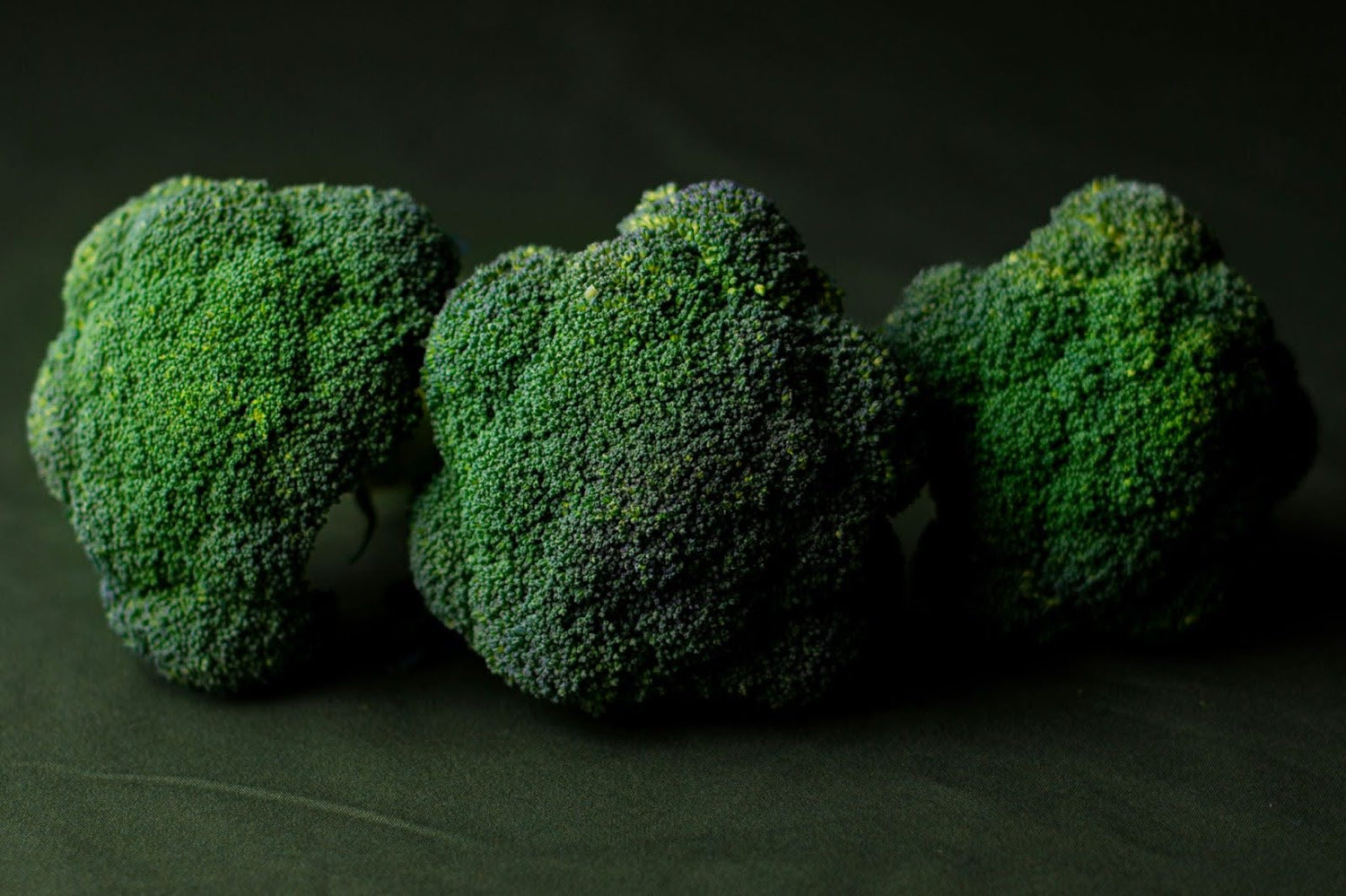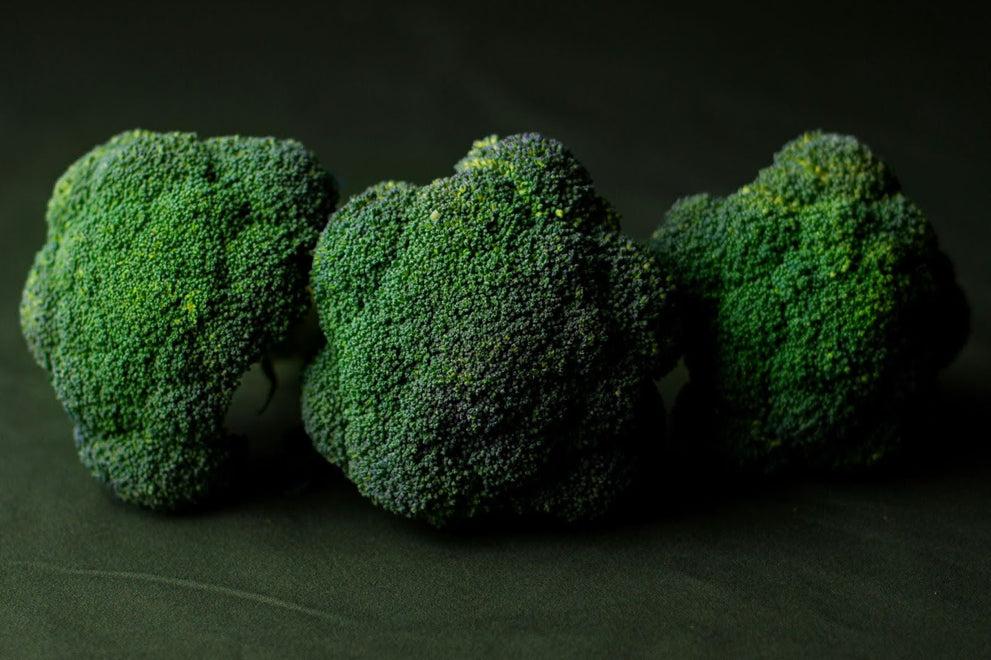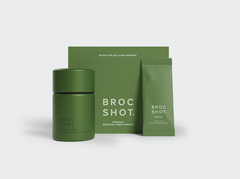Key Takeaways:
- Build Your Base With Fiber: Vegetables, legumes, whole grains, and fruit are foundational foods to improve gut health; their fiber content feeds beneficial microbes and supports regularity.
- Ferments + Healthy Fats Matter: Yogurt, kefir, sauerkraut, kimchi, olive oil, and avocado are reliable gut-friendly foods and among the best foods for digestion.
- Keep Support Simple With Natural Sulforaphane: Broc Shot delivers natural sulforaphane from whole broccoli seed powder, which is third-party tested, clinically studied to activate NRF2, and recommended to take with or without food.
When you’re looking for foods to improve gut health, the best advice is simple and repeatable: build meals around fiber-rich plants, add fermented foods to support microbial diversity, and include healthy fats that benefit digestion. Once that foundation is in place, adding other daily habits can make the routine even stronger.
That’s where natural sulforaphane from whole broccoli seed powder comes in. Broc Shot delivers this nutrient in a third-party tested format that has been clinically studied to activate NRF2. It’s easy to take with or without food and helps enhance detoxification, target inflammation, and support gut restoration—making it a seamless companion to a gut-healthy diet.
Build Your Plate Around Fiber-Rich Plants
Fiber is the foundation of a gut-healthy diet. The easiest way to get enough fiber is by building your meals around plants that you enjoy eating every day—colorful vegetables and fruits, legumes, and whole grains are examples. These foods feed beneficial microbes, support regular digestion, and help you meet your fiber needs naturally, without tracking or counting. Think of them as the best foods for digestion and long-term gut health; a simple, repeatable base that feels satisfying rather than strict. Here are some top choices when it comes to foods that are rich in fiber:
Vegetables And Fruit
Color drives variety. Leafy greens, brassicas, carrots, peppers, berries, apples, and pears bring both soluble and insoluble fiber that keep digestion healthy. Polyphenols in colorful produce act like “microbe food,” making them true nourishment for the gut. Aim to fill half your plate with plants for the best foods for digestion.
Beans and Legumes
Lentils, chickpeas, black beans, and navy beans deliver fiber and prebiotic starch. If you’re sensitive to fiber, start small and increase your intake gradually. Toss beans into grain bowls, blend them into soups, or make a simple lentil salad with lemon and olive oil.
Whole Grains
Oats, quinoa, barley, brown rice, and buckwheat help you hit fiber targets that most people miss. Oats are standouts for breakfast; barley or quinoa anchor easy weeknight bowls. These grains are cornerstone gut-friendly foods.
Adding Ferments And Healthy Fats To Your Diet
Fermented foods and healthy fats round out your base of foods to improve gut health. A small daily serving of a fermented food like yogurt, kefir, sauerkraut, kimchi, miso, or tempeh can help diversify your microbiome, while olive oil and avocado make veggie-heavy plates more satisfying and support absorption of fat-soluble nutrients. Together, these gut-friendly foods help meals feel balanced and steady with fewer sugar spikes and more staying power, which is why they’re often listed among the best foods for digestion.
Fermented Foods
Yogurt, kefir, sauerkraut, kimchi, miso, and tempeh are fermented foods that support microbial diversity with their natural content of probiotic bacteria. Keep portions small but frequent. If you don’t tolerate dairy, try sauerkraut or kimchi with lunch, or miso stirred into warm broth.
Healthy Fats
Extra-virgin olive oil and avocado are two healthy fats that make high-fiber meals more satisfying and help you absorb fat-soluble nutrients. Drizzle olive oil on salads and roasted vegetables; add half an avocado to grain bowls for a creamy, gut-friendly finish.
Cruciferous Vegetables And Natural Sulforaphane
Broccoli, Brussels sprouts, kale, and cauliflower are MVPs in a gut-healthy diet. Your body can convert compounds in these vegetables into sulforaphane, a compound that has been clinically studied to activate NRF2, a key cellular defense pathway. That’s one reason many people add a daily sulforaphane supplement to support their routine. Broc Shot’s formula uses whole broccoli seed powder (not broccoli sprout powder), is third-party tested, and recommended to take with or without food. It is a gut health supplement that helps enhance detoxification, target inflammation, and support gut restoration.
A Simple Day Using Foods To Improve Gut Health
Your goal is for foods that improve gut health to become a habit, not a project. Find an easy routine—fiber-rich breakfast, plant-forward lunch, an unprocessed snack, and a balanced dinner, so you’re defaulting to gut-friendly foods without overthinking it. Keep portions satisfying, and lean on whole grains, legumes, colorful produce, and fermented foods.
Add a daily serving of natural sulforaphane from whole broccoli seed powder for extra gut health support. Broc Shot’s natural sulforaphane is third-party tested, has been clinically studied to activate NRF2, and is recommended to take with or without food; it helps enhance detoxification, targets inflammation, and supports gut restoration alongside your plate.
Use this sample meal guide to improve gut health front and center:
- Breakfast: Oats with yogurt, berries, and chia
- Lunch: Salad with quinoa, chickpeas, olive oil, lemon
- Snack: Apple and almonds or almond butter
- Dinner: Salmon or tofu, roasted broccoli, sweet potato
-
Daily support: A serving of Broc Shot broccoli powder. It helps enhance detoxification, targets inflammation, and supports gut restoration.
Quick Swaps To Nudge Your Plate In The Right Direction
Small, realistic swaps are the fastest way to increase foods that improve gut health without overhauling your routine. Trade ultra-processed standbys for gut-friendly foods that deliver fiber, protein, and healthy fats. Opt for roasted instead of fried, whole grains instead of refined, and sparkling water in place of sugary sodas.
These changes shift your plate toward the best foods for digestion and gradually crowd out choices that work against your gut health. Use the swaps below as a grocery list and a takeout filter so your everyday meals trend toward foods that heal the gut: simple, satisfying, and easy to repeat.
- White toast → whole grain toast with avocado
- Creamy dressing → olive oil + lemon + herbs
- Sugary cereal → overnight oats with berries and chia
- Candy → dates with nut butter or dark chocolate squares
- Fries → roasted potatoes or air-fried carrots
- Soda → sparkling water with citrus
- Sugary dessert → yogurt with fruit and walnuts
Where Broc Shot Fits Into Your Daily Routine
A routine works when it’s simple. Broc Shot delivers natural sulforaphane from whole broccoli seed powder in a third-party tested format that has been clinically studied to activate NRF2. It’s recommended to take it with or without food, so it slots into breakfast, a midday break, or your evening wind-down. It helps enhance detoxification, targets inflammation, supports gut restoration, and complements your best foods for digestion.
Want step-by-step help? See our guide on how to fix gut health.
Hydration, Sleep, And Stress: The Non-Food Levers
Food does most of the heavy lifting, but your gut also responds to the way you hydrate, sleep, and handle stress. Aim for steady fluids across the day, such as water, herbal tea, or sparkling water, to work with your fiber intake.
Prioritize a wind-down routine and a consistent sleep window; your microbiome follows daily rhythms, and erratic nights can throw off digestion. Gentle movement helps too: a 10–20 minute walk after meals can support digestive regularity. Keep a foundation of foods to improve gut health, then layer in these simple habits for smoother, more predictable digestion.
Make It Stick: A 10-Minute Weekly Prep
A little planning turns good intentions into a gut-healthy diet you can repeat. Pick one grain (quinoa or barley), one legume (chickpeas or lentils), and two vegetables to roast; prep them and store them in clear containers so building meals takes minutes. Keep a fermented food on hand (yogurt, kefir, or sauerkraut) and a healthy fat (extra-virgin olive oil) for quick flavor and nutrient absorption. If you want extra support, add daily natural sulforaphane from whole broccoli seed powder.
Final Thoughts
Center your choices on foods to improve gut health, plants, ferments, whole grains, and healthy fats, then double down on gut support with Broc Shot. Natural sulforaphane from whole broccoli seed powder is a straightforward daily addition that’s third-party tested, clinically studied to activate NRF2, and recommended to take with or without food. It helps enhance detoxification, targets inflammation, and supports gut restoration, making it an easy habit alongside a fiber-forward plate.
Read also:
- Nutrient-Rich Foods That May Boost Immunity While Undergoing Chemotherapy
- Sulforaphane Benefits for Skin: Natural Support for Radiance And Repair
- How Compounds in Broccoli Sprouts May Support Cancer Defense
Frequently Asked Questions About Foods To Improve Gut Health
What makes a food “good” for gut health?
High-fiber plants, fermented foods, and minimally processed choices tend to support beneficial microbes and regular digestion. Vegetables, fruit, legumes, whole grains, nuts, seeds, and ferments are reliable gut-friendly foods. Over time, these choices support the microbiome to help reduce bloating and irregularity. But consistency is what turns them into true foods to improve gut health.
Do I have to eat fermented foods daily?
Daily helps, but several times a week can still make a difference, especially if your baseline meals are fiber-forward. If dairy isn’t ideal for you, use sauerkraut, kimchi, tempeh, or miso instead of yogurt and kefir. Start with small portions and increase as your gut adjusts. Your comfort matters more than a strict intake.
Are cruciferous vegetables hard to digest?
They can be if you increase your intake quickly. Start with small portions of roasted broccoli or cauliflower and increase them gradually. Cooking often improves digestive tolerance. The effort is worth it because crucifers are cornerstone foods that support a healthy gut.
Where does sulforaphane fit into a gut-healthy diet?
Natural sulforaphane has been clinically studied to activate NRF2, a key pathway for cellular defense. Broc Shot delivers natural sulforaphane from whole broccoli seed powder in a third-party tested format and is recommended to take with or without food. It helps enhance detoxification, targets inflammation, and supports gut restoration alongside fiber-rich meals. Think of it as daily gut support, not a replacement for good food.
Can a supplement replace fiber?
No, fiber from plants does jobs that supplements can’t fully cover. Use Broc Shot to support your routine while you build meals around vegetables, legumes, whole grains, and fruit. A simple combo of ample plants + natural sulforaphane works well for real life. Aim for habits you can repeat.
What are quick breakfasts that are gut-friendly?
Overnight oats with yogurt and berries, chia pudding with fruit, or scrambled eggs with greens and avocado are easy breakfast wins. Add an additional serving of broccoli powder if you like. That keeps your foods to improve gut health front and center.
How long until I notice changes?
Some people feel lighter or more regular within one to two weeks of increasing fiber and ferments. Others need more time while their microbiome adapts. Hydration and daily movement help. Keep your routine simple and repeatable.
Should I take sulforaphane with food?
It’s recommended to take it with or without food, so choose what fits your routine best. Many people eat it with breakfast or as a midday snack. Timing matters less than consistency. Pick a daily slot you won’t skip.
What if dairy bothers me?
You’re not alone; many adults have some lactose intolerance. Try lactose-free yogurt or kefir, or use fortified plant milks. Some people tolerate yogurt and hard cheeses better than milk. Track how you feel and adjust as needed.
Do I need to cut out all the treats?
No. Pair sweets with protein or fiber to soften their impact, think yogurt with fruit or dark chocolate with nuts. Keep portions modest and choose treats you truly enjoy. Over time, most of your plate will shift toward the best foods for digestion without feeling restrictive
Sources:
- Johns Hopkins Medicine. (n.d.). 5 foods to improve your digestion.https://www.hopkinsmedicine.org/health/wellness-and-prevention/5-foods-to-improve-your-digestion
- Marco, Maria L., et al. “Health Benefits of Fermented Foods: Microbiota and Beyond.” Current Opinion in Biotechnology, vol. 44, 2017, pp. 94–102. doi:10.1016/j.copbio.2016.11.010.
- Kaczmarek, Joanna L., et al. “Whole Grain Consumption and Gastrointestinal Health: A Review of Intervention Trials in Humans.” Nutrition Reviews, vol. 75, no. 4, 2017, pp. 334–353. doi:10.1093/nutrit/nux002.
- Clarke, Jonathan D., et al. “Multi-Targeted Prevention of Cancer by Sulforaphane.” Cancer Letters, vol. 269, no. 2, 2008, pp. 291–304. doi:10.1016/j.canlet.2008.03.029.






